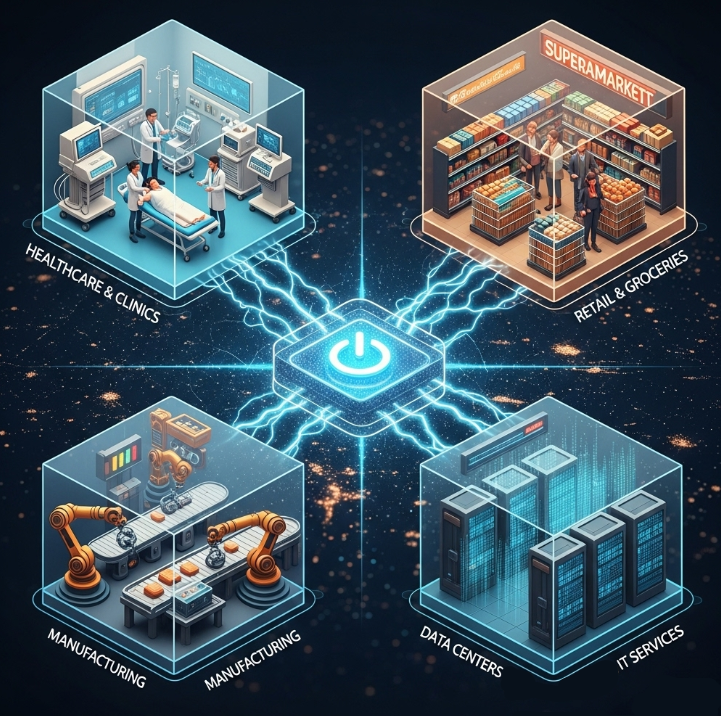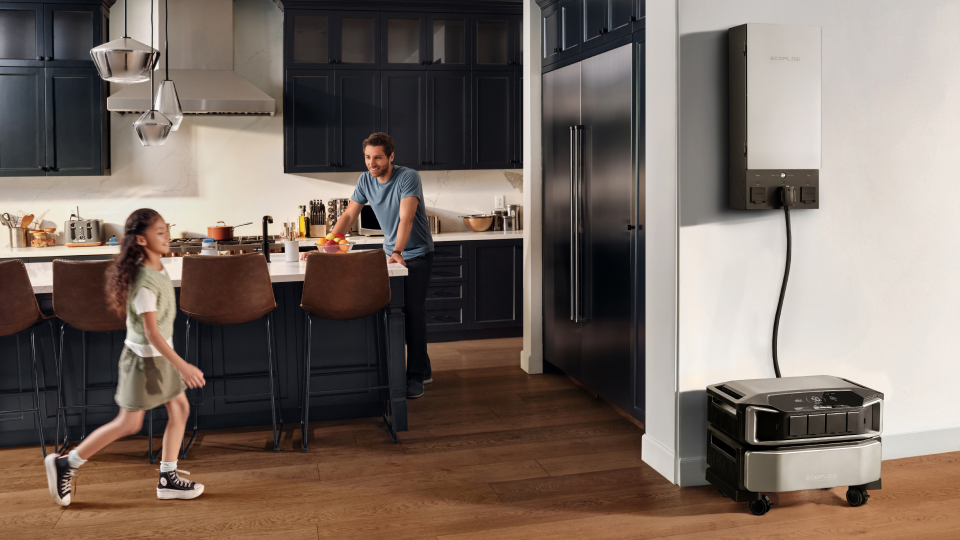Small Business Energy Storage: Reducing Costs with Solar and Battery Systems
- The High Price of Relying on the Grid: Why Your Business Is at More Risk Than You Think
- Understanding Your Utility Bill: The Hidden Charges That Cost You Money
- Taking Back Control: How Solar and Battery Storage Turn a Cost into a Benefit
- More Than Just Savings: The Full Advantage of Energy Independence
- The Modern Solution for Business Energy Management
- Powering Your Business's Future
As a small business owner, you’re always juggling different factors to protect your profits. One of your biggest and most unpredictable costs is likely your electricity bill. Rising prices, unexpected fees, and the constant risk of power outages can interrupt your work and cut into your earnings.
But what if you could turn this problem into a smart investment? By combining solar panels with a commercial battery storage system, you can gain control over your energy expenses, keep your business safe from blackouts, and fuel your success with clean, dependable power.
The High Price of Relying on the Grid: Why Your Business Is at More Risk Than You Think
Depending on the power company is a bigger risk than many business owners realize. Power outages aren't just small hassles; they are real financial dangers. In the United States, grid failures cost businesses about $150 billion every year.
For a small business, the effect is felt right away. A single four-hour power outage can cost between $10,000 and $20,000, and an outage that lasts for several days can easily lead to over $50,000 in losses. For companies that depend on data and online sales, the cost of being offline can be anywhere from $137 to $427 per minute.
Some industries are especially at risk:
Healthcare and Clinics: A steady power supply is vital for patient safety, life-support machines, and meeting legal requirements.
Retail and Groceries: An outage means cash registers that don't work and thousands of dollars in spoiled food.
Manufacturing: Downtime stops production, harms delicate equipment, and causes expensive delays.
Data Centers and IT Services: Constant power is necessary to avoid major data loss and service interruptions.
But the real cost of an outage is more than just the first few hours of lost business. It also includes possible damage to electronics, the expense of recovering data, and, most importantly, long-term damage to your reputation. A customer who sees your business closed during a blackout might not come back. This makes relying on the grid an increasing risk, particularly as old power systems struggle to keep up with extreme weather and the shift to new energy sources. Depending on the grid is no longer a reliable plan for your business; it's like hoping for the best in a world that's getting more and more unpredictable.


Understanding Your Utility Bill: The Hidden Charges That Cost You Money
Besides the immediate danger of outages, the ongoing expense of your monthly utility bill slowly eats away at your profits. Business electricity bills are known for being complicated, but two main parts are usually the cause of the high costs: demand charges and Time-of-Use rates.
The Peak Demand Charge Problem
Did you know that a large part of your bill could be decided by just 15 minutes of your entire month's activity? For many businesses, demand charges can make up 30% to 70% of their total electricity bill.
A demand charge is not based on how much energy you use in total (measured in kilowatt-hours, or kWh). Instead, it's a fee based on your single biggest spike in power usage (measured in kilowatts, or kW) during the month. Think of it like this: your power company has to have a grid that's big enough to handle your business's highest possible power need, even if you only reach that peak for a few minutes when you turn on all your equipment at the same time. You end up paying for that "just-in-case" capacity all month long.
This leads to a frustrating and expensive situation, as shown below.
Metric | Business A (Steady Operations) | Business B (Spiky Operations) |
Monthly Energy Consumption | 19,000 kWh | 15,000 kWh |
Peak Demand (Highest 15-min Spike) | 60 kW | 100 kW |
Energy Charge (Consumption) | $1,000 | $800 |
Demand Charge (Peak Spike) | $705 | $1,175 |
Total Monthly Bill | $1,705 | $1,975 |
Conclusion | Used more energy, but paid less. | Used 21% less energy, but paid 16% more. |
*Table based on sample utility rates and scenarios.
As the table shows, Business B paid almost $200 more even though it used much less energy, all because of one short period of high demand.
The High Cost of Power During "Business Hours"
Making things even more complicated are Time-of-Use (TOU) rates, where the price of electricity changes depending on the time of day. Power companies usually split the day into three periods:
- On-Peak: The most expensive hours, usually in the late afternoon and early evening (like 4 p.m. to 9 p.m.) when the most people are using electricity.
- Off-Peak: The cheapest hours, usually late at night and on weekends when fewer people are using electricity.
- Mid-Peak: A time in between with medium prices.
The main issue for small businesses is that the expensive on-peak hours often happen at the same time as their busiest and most important work hours. This means you have to buy the most expensive power right when you need it the most. These complicated and costly billing systems are a sign of a power grid that is under a lot of strain. But for a business with its own energy storage, these high prices aren't just extra costs—they are clear chances to save money.
Taking Back Control: How Solar and Battery Storage Turn a Cost into a Benefit
A commercial solar and battery storage system gives you the power to fight back against high electricity bills. It uses two strong, automatic money-saving methods that directly address the most expensive parts of your bill.
Your New Money-Saving Tool #1: Peak Shaving
Peak shaving is the best way to avoid demand charges. Your battery storage system keeps an eye on your building's energy use. When it sees a spike in power—like when your air conditioning, kitchen appliances, and machines all start at once—it immediately releases stored energy to cover the extra need.
Instead of getting that expensive burst of power from the grid, you use the energy you already have in your battery. This "shaves off" the peak, keeping your power use steady and low from the power company's point of view. Since demand charges can be 40% or more of a business's bill, this method alone can save you a lot of money each month.
Your New Money-Saving Tool #2: Time-of-Use Arbitrage
Time-of-Use (TOU) arbitrage is a simple but smart idea: buy power when it's cheap and use it when it's expensive.
- Charging: The system automatically charges the battery during off-peak hours at night when grid power is cheap, or it stores the free, clean energy made by your solar panels during the day.
- Discharging: It then uses that stored, cheap energy to run your business during the expensive on-peak hours. This greatly cuts down on the amount of high-priced electricity you need to buy from the power company.
A commercial battery system is not just a backup power source. It's a smart, automatic tool for managing your money. Its software works around the clock, making thousands of quick decisions to lower your energy costs, all without you having to do anything. It’s like having an automatic efficiency expert working to improve your business's finances.


More Than Just Savings: The Full Advantage of Energy Independence
While the daily savings are great, the total benefit of a solar and battery system is much bigger. It gives you stability and a strong edge over your competition.
From Blackouts to Business as Usual
With a commercial battery backup system, a power outage from the grid doesn't have to mean shutting down your business. The system can spot a grid failure and switch to battery power in a fraction of a second. This smooth changeover keeps your lights on, your payment systems working, your data servers safe, and your business running. You can keep serving customers and making money while your competitors are closed. This makes you a dependable business in your community, which builds a lot of trust and loyalty with your customers.
Building a Strong and Green Brand
Putting money into solar and battery storage also says a lot about your brand. It shows your customers, employees, and community that you are modern, dependable, and care about the environment. Using clean energy lowers your carbon footprint and gives you a great story to tell in your marketing that connects with today's shoppers.
In the end, a commercial battery system is like business insurance, but with one big difference: it pays you back every day. The money you save from peak shaving and TOU arbitrage is like a daily dividend, while the backup power is the priceless protection that keeps your whole business safe when things go wrong.
The Modern Solution for Business Energy Management
Old-style commercial energy systems are often inflexible, costly, and too big. Today’s small businesses need a solution that is as quick and flexible as they are. The EcoFlow DELTA Pro Ultra is a whole-home backup power system made to fit this need, giving you amazing flexibility and power for business use.
A big worry for any business owner is spending a lot of money on something that won't work for them in the future. The DELTA Pro Ultra solves this problem with its unique modular design.
Grows with You (6 kWh - 90 kWh): You can begin with a single 6 kWh battery to power your most important things, see the savings, and then easily add more power as your business gets bigger. This changes the purchase from one big, risky choice to a smart, step-by-step investment that grows with your business.
Powerful Performance (7.2 kW - 21.6 kW): One unit gives you a strong 7.2 kW of power, which is enough to run heavy machines. By connecting more units, you can get up to 21.6 kW, enough to power a whole business, including large air conditioning systems.
Smooth Backup: With a switchover that happens in an instant, the whole home backup makes sure that when the grid fails, your power stays on without any interruption. This makes sure that when the grid fails, your power stays on without any interruption. This protects your most delicate electronics and keeps your business running smoothly.
Powering Your Business's Future
The days of being at the mercy of changing energy prices and an unreliable grid are over. A commercial solar and battery storage system is more than just a new piece of equipment; it is a smart investment in control, stability, and profit. With great financial incentives available and modern, flexible options like the EcoFlow DELTA Pro Ultra, securing your business's energy future is easier than ever. Take control of your power and turn your biggest expense into your greatest strength.
For press requests or interview opportunities, reach out to our media team
media.na@ecoflow.com